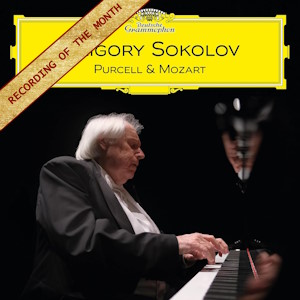
Grigory Sokolov (piano)
Purcell and Mozart
rec. live, 16 August 2023, Auditorio Kursaal, San Sebastián, Spain (Mozart); live, 18 August 2023, Palacio de Festivales de Cantabria, Santander, Spain (Purcell & Encores)
Deutsche Grammophon 4866263 [2 CDs: 94]
It’s a remarkable phenomenon that Grigory Sokolov has, over the years, attained cult status. I’ve been a devoted follower for many years since my piano teacher introduced me to his recordings in the 1990s. I was fortunate at that time to hear him twice live in concert, both in a solo recital and in a concerto performance. He no longer makes studio recordings, patched together from various takes, but prefers the spontaneity of the ‘live’ concert situation. Similarly, he no longer plays with orchestras, explaining that he doesn’t get enough rehearsal time. Born in Leningrad in 1950, he gave his first solo performance at the age of twelve. In 1973, he graduated from the Leningrad Conservatory. Seven years previously, he’d won first prize at the Third International Tchaikovsky Competition in Moscow. His repertoire embraces the classical and romantic, reaching as far back as Byrd, Couperin and Rameau. As an artist, he is self-effacing, focusing all of his intellect and energy on the music rather than on the extraneous trappings that are part and parcel of the life of a travelling virtuoso. He doesn’t give interviews, won’t play on a piano more than five years old, and is reluctant to announce the programmes of his recitals until near the time of the concert.
Deutsche Grammophon continues to release his live solo recitals. He usually plays the same programme over a season, and in 2023 he combined works of Purcell and Mozart in a total of seventy recitals. The performances on this 2 CD set derive from two separate concerts which took place in Spain in August 2023. The live ambience is confirmed by the odd shuffle and bronchial interjection from the audience, but these are discreetly picked up and for me, at least, positively add to the frisson of the event. Applause is retained.
The pairing of Purcell and Mozart may seem unusual, but having listened to this 2 CD set many times over the past fortnight, I can assure you that it works very well indeed. CD 1 is devoted to the keyboard works of Henry Purcell. The recital kicks off with a charming rendition of the Ground in Gamut. The trills sparkle above a discreet accompanying figure. Three Suites sit centre stage, in G minor, A minor and D minor, interspersed with more modest offerings. Each Suite consists of four dances. Purcell lets his imagination run wild with melodic and harmonic twists. Sokolov deftly incorporates dazzling ornamentation into the line throughout. A New Scotch Tune rings out with determination and rhythmic punch, whilst A New Scottish Tune sounds improvised. The Trumpet Tune struts out with confidence and resolve. Listeners will recognise Round O as the theme from Britten’s Young Person’s Guide to the Orchestra. There’s some impressive ornamentation in the final Chaconne in G minor, splendidly articulated.
I’ve always greatly admired Vladimir Horowitz’s late recording of Mozart’s Sonata in B flat, K. 333 which he set down in the studio in the last years of his life. Sokolov’s take on the work couldn’t be more different. It’s more contained and less romantically etched. This is most noticeable in the central Andante cantabile. Yet there are playful and upbeat aspects to the outer movements. I certainly think that the tempi for all three movements seem to me just right. There’s some stunning finger work in the Allegro grazioso finale, which proceeds as a graceful rondo.
It was no less than Alfred Brendel who once said that the Adagio in B minor, K540, is the greatest piece in all solo piano music. A sombre work composed in 1788, it mirrors the struggles of Mozart during that particular year, beset by financial problems and struggling to get commissions. In Sokolov’s performance, the suspensions and diminished sevenths by which the composer creates a troubled and tragic mood seem emphasised and underlined to powerful effect. It’s a highly expressive account.
What would a Sokolov recital be without his usual generous offering of encores? Rameau, a composer close to his heart, is followed by two Chopin pieces. The Raindrop Prelude I personally find rather tedious as a work; I much prefer the melancholy strains of the Mazurka in F minor, Op. 63, No. 2. Rameau again, lavished with such detail, and finally an exquisite arrangement of J.S. Bach’s Prelude in E minor arranged by Alexander Siloti.
It’s the superlative recording quality which adds that final allure to these wonderful performances. Sokolov is fussy about his pianos and the expertly voiced instrument chosen has a rich, warm timbre. Although the year has just begun, I think that this superb release will probably go to the top of my list of Recordings of the Year.
Stephen Greenbank
Buying this recording via a link below generates revenue for MWI and helps us keep free access to the site


Contents:
CD1
Henry Purcell (1659–1695)
A Ground in Gamut, Z. 645
Suite No 2 in G minor, Z. 661
A New Irish Tune, Z. 646
A New Scotch Tune, Z. 655
Trumpet Tune, ZT 678
Suite No 4 in A minor, Z. 663
Round O, ZT 684
Suite No 7 in D minor, Z. 668
Chaconne in G minor, ZT 680
CD2
Wolfgang Amadeus Mozart (1756–1791)
Piano Sonata No 13 in B-flat major, K. 333
Adagio in B minor, K. 540
Encores:
Jean-Philippe Rameau (1683–1764)
VI. Les sauvages [Nouvelles suites de pièces de clavecin, Suite in G Major, RCT 6]
Frédéric Chopin (1810–1849)
Prelude in D-flat major “Raindrop”, Op 28/15
Mazurka No 40 in F minor, Op 63/2
Jean-Philippe Rameau
Tambourin [Suite in E minor, RCT 2]
Johann Sebastian Bach (1685–1750)
Prelude in E minor, BWV 855 (arr. in B minor by Alexander Siloti)

















